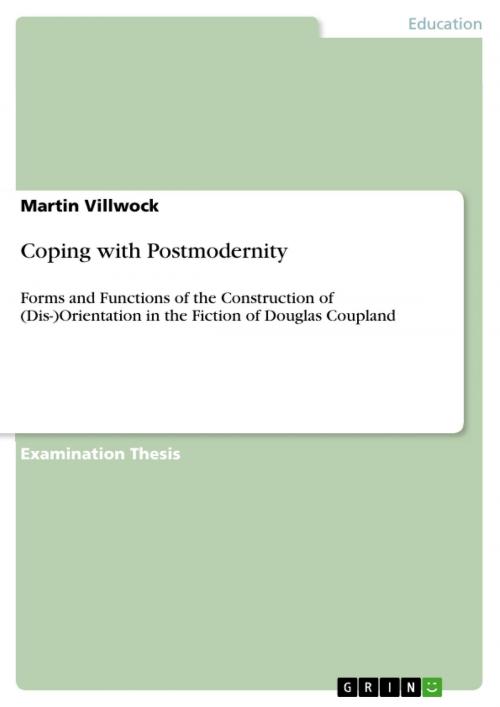Coping with Postmodernity
Forms and Functions of the Construction of (Dis-)Orientation in the Fiction of Douglas Coupland
Nonfiction, Reference & Language, Study Aids, ESL, Foreign Languages| Author: | Martin Villwock | ISBN: | 9783640933785 |
| Publisher: | GRIN Verlag | Publication: | June 8, 2011 |
| Imprint: | GRIN Verlag | Language: | English |
| Author: | Martin Villwock |
| ISBN: | 9783640933785 |
| Publisher: | GRIN Verlag |
| Publication: | June 8, 2011 |
| Imprint: | GRIN Verlag |
| Language: | English |
Examination Thesis from the year 2008 in the subject English - Pedagogy, Didactics, Literature Studies, grade: 1,3, University of Cologne (Englisches Seminar), language: English, abstract: In the following chapter of this paper, an outline of the present ontological crisis in terms of Lyotard's 'postmodern condition' will be given. Throughout the discussion of Coupland's fiction, this concept will be relevant for its influence on the characters' thoughts and emotions. Furthermore, the chapter will analyze the importance and self-referentiality of narrative structures in Coupland's work. The characters in Coupland's novels often come up with a plentitude of more or less successful strategies in order to deal with the semantic void they experience. For this chapter, material will be presented predominantly from the novels All Families are Psychotic, Generation X and Microserfs. The third chapter will focus on the presentation of working life in Coupland's prose. His novels reveal that work today has lost its former function as a source of orientation. In this analysis, the concept of alienation as introduced by Karl Marx will be used in order to grasp the nature of the conflict that the characters experience in their working lives in Coupland's novels. The chapter will focus on the presentation of working life in Generation X, Microserfs and Shampoo Planet. A fourth chapter will introduce yet a further source of disorientation - the hyperreality constituted by the media. Here, Baudrillard's observations (1983 and 1994) will serve as a starting point in a discussion of the experience of the 'hyperreal' and the possibility of contact with the 'real' in Coupland's work. Again, material will be presented from the novels Generation X, Microserfs and Shampoo Planet. The subsequent chapter will consider the important role that irony plays in several of the analyzed novels. Douglas Coupland, particularly in his first novels, impresses his readers with a smart and thoroughly ironic tone. In his later novels, however, he is deliberately trying to establish a more sincere language, mirrored by his characters' desire to embark on a sincere quest for meaning. The functions of the presentation of the different forms of disorientation and re-orientation will be at the center of my discussion of Coupland's fiction.
Examination Thesis from the year 2008 in the subject English - Pedagogy, Didactics, Literature Studies, grade: 1,3, University of Cologne (Englisches Seminar), language: English, abstract: In the following chapter of this paper, an outline of the present ontological crisis in terms of Lyotard's 'postmodern condition' will be given. Throughout the discussion of Coupland's fiction, this concept will be relevant for its influence on the characters' thoughts and emotions. Furthermore, the chapter will analyze the importance and self-referentiality of narrative structures in Coupland's work. The characters in Coupland's novels often come up with a plentitude of more or less successful strategies in order to deal with the semantic void they experience. For this chapter, material will be presented predominantly from the novels All Families are Psychotic, Generation X and Microserfs. The third chapter will focus on the presentation of working life in Coupland's prose. His novels reveal that work today has lost its former function as a source of orientation. In this analysis, the concept of alienation as introduced by Karl Marx will be used in order to grasp the nature of the conflict that the characters experience in their working lives in Coupland's novels. The chapter will focus on the presentation of working life in Generation X, Microserfs and Shampoo Planet. A fourth chapter will introduce yet a further source of disorientation - the hyperreality constituted by the media. Here, Baudrillard's observations (1983 and 1994) will serve as a starting point in a discussion of the experience of the 'hyperreal' and the possibility of contact with the 'real' in Coupland's work. Again, material will be presented from the novels Generation X, Microserfs and Shampoo Planet. The subsequent chapter will consider the important role that irony plays in several of the analyzed novels. Douglas Coupland, particularly in his first novels, impresses his readers with a smart and thoroughly ironic tone. In his later novels, however, he is deliberately trying to establish a more sincere language, mirrored by his characters' desire to embark on a sincere quest for meaning. The functions of the presentation of the different forms of disorientation and re-orientation will be at the center of my discussion of Coupland's fiction.















